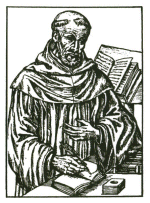The Heresy of Pelagius
Pelagianism has as its central theme the proposition that man's free-will is unimpaired, that no influence fetters or dominates his choice between good and evil, and that he has all the power he ever had, or needs to have, to will and to do what is spiritually good. This is in direct opposition to the concept of Adam's fall being the cause of man being, at first, a sinner. It argues that the consequences of Adam's sins were restricted to himself - that he did not transmit either guilt or corruption to his posterity. The Pelagian's argued that man enters the world with as pure a nature as Adam had possessed in innocence. This requires a re-modeling of the Gospels as a remedial scheme rather than a scheme to recover man from the damnable position of original sin.
![]()
 The life story of Pelagius (c.AD360-418) cannot be told with any great accuracy, but we have
such writings by him and contemporary references to him as to
bring him into a clearer light than others of the time. By some,
it is suggested that he adopted the "latin" name of
Pelagius and that his real name was Morgan and that he was of a
British tribe from what we now call Wales. He was evidently a man
of high abilities and good learning, though to what degree he
obtained his learning in Britain cannot be known. It is certain
that he was born in Roman Britain late in the fourth century and
that as a young man he traveled widely, residing for some time at
Rome and later visiting Egypt and Palestine.
The life story of Pelagius (c.AD360-418) cannot be told with any great accuracy, but we have
such writings by him and contemporary references to him as to
bring him into a clearer light than others of the time. By some,
it is suggested that he adopted the "latin" name of
Pelagius and that his real name was Morgan and that he was of a
British tribe from what we now call Wales. He was evidently a man
of high abilities and good learning, though to what degree he
obtained his learning in Britain cannot be known. It is certain
that he was born in Roman Britain late in the fourth century and
that as a young man he traveled widely, residing for some time at
Rome and later visiting Egypt and Palestine.
St Jerome in the prologue to his Commentary of Jeremiah refers contemptuously to Pelagius as "pultibus Scottorum praegravatus" (stuffed with the porridge of the Scots) and this has led some to suppose that he was an Irishman, but it is known that for Jerome the word "Scot" was sometimes merely a term of abuse and that he thought of Britain and Ireland alike as remote and barbarous nations.
![]()
Pelagius had as his ally in the controversy a supposed Irishman bearing the latinised name Coelestius (Celleagh or Kelly). In the year AD413, according to the chronicler Prosper of Aquitaine, Pelagius uttered his "dogma against the grace of Christ," and in AD429 Agricola, son of a Pelagian bishop Severianus, corrupted the British churches with his heresy. Bede adds to this that the orthodox Britons were unable to confute the Pelagian teachers and sought aid from the bishops of Gaul. The latter, holding a council, deputed two of their number, Germanus of Auxerre and Lupus of Troyes, to visit the British church and contend with the heretics in public debate (AD429). Following the contents of the Life of Germanus by Constantinus of Lyons (c.AD480), Bede describes the miraculous escape of the ship that bore the emissaries to Britain, and a great assemblage of men, women, and children that gathered to hear them. After the Pelagians had addressed the multitude with empty words, Germanus and Lupus, "pouring out torrents of eloquence," confounded the heretics and won the verdict of the people. When orthodoxy had, according to Constantius, been thus vindicated, the visiting bishops went to St Alban's tomb, where Germanus left precious relics and took away a portion of the martyr's dust still miraculously red with his blood.
Constantius and Bede report a second visit (c.AD444?) of Germanus to Britain, with a disciple of Lupus named Severus, to combat a new wave of Pelagianism. By miracles and preaching he is said to have won the Britons back to the Catholic faith and procured the banishment of the heretics. If this visit is historical, it may point to an endemic strain of Pelagianism in Britain during the fifth century.
For further reading, see:
1. Bonner, A. (2018) "In Praise of Pelagius." London: Church Times (31 August 2018). https://www.churchtimes.co.uk/articles/2018/31-august/features/features/in-praise-of-pelagius (accessed 23/4/19)
small(transp).gif)

